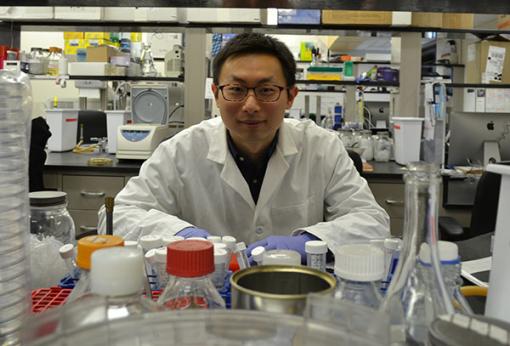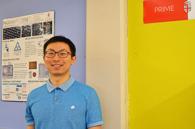Sub Navigation
Xu to ‘Leverage’ Research Via Open Graduate Education
 Yun “Ryan” Xu, a PhD candidate studying post-trauma pneumonia, wants to do more than understand why it occurs. “My motivation is real-life impact,” he says. “I want to leverage lab experience to bring something to patients to promote health care.”
Yun “Ryan” Xu, a PhD candidate studying post-trauma pneumonia, wants to do more than understand why it occurs. “My motivation is real-life impact,” he says. “I want to leverage lab experience to bring something to patients to promote health care.”
For Xu and the other current doctoral students, the Open Graduate Education program is a vehicle to combine studies in unique ways to achieve their goals and to earn a secondary master’s degree.
Xu, a Pathobiology student who entered the program in 2014, is past the midpoint of the Program in Innovation Management and Entrepreneurship Engineering (PRIME), one of nearly 50 areas of master’s study offered through this Graduate School initiative. This semester, he and his teammates are learning how to develop a product, including conducting surveys to validate the hypothesis and identify the best market segment. In the Jamieson Lab, he is wrapping up the first part of the post-trauma pneumonia research and writing a paper.
In his spare time this fall, he founded the Brown Graduate Consulting Club, a student group that meets weekly. The Brown Graduate Consulting Club (BGCC) gained the Graduate Student Council’s student-group seal in October, and Xu serves as president. Like many graduate consulting clubs at other top-tier research universities, BGCC aims to build a community through weekly activities, such as case practice and short presentations, and hosts industry speakers.
“Advanced candidates have a separate recruiting process,” he explains, “and the group activities are meant to prepare the candidates for future careers.” Eventually, he hopes the group will serve as a think tank capable of providing pro bono consulting services to the local community, like some other Ivy League clubs.
Along with club meetings, his schedule is packed with PhD research and PRIME coursework. “Balancing the demands of two graduate programs can be challenging,” Xu says, “Time management and communication with my advisor are critical.” Dr. Amanda Jamieson, his advisor, has provided tremendous support, he says, and he appreciates the resources and support of the PRIME program and the Graduate School.
 In his combined studies, the commonality between scientific research and technology commercialization came as a surprise to him. Both start with background research: one on public knowledge and the other on the market and patent landscape. In biology research, a hypothesis typically leads to testing the functions of a gene or molecule; in technology commercialization, a product concept is also usually tested in the market by using a prototype. In both areas, quantifiable data are essential to drive a project forward.
In his combined studies, the commonality between scientific research and technology commercialization came as a surprise to him. Both start with background research: one on public knowledge and the other on the market and patent landscape. In biology research, a hypothesis typically leads to testing the functions of a gene or molecule; in technology commercialization, a product concept is also usually tested in the market by using a prototype. In both areas, quantifiable data are essential to drive a project forward.
There are differences, of course. “In doctoral study, we tend to focus on a problem and don’t look up to see if it will be useful,” he observes. “Study is like a one-way street, with an occasional detour. The technology commercialization process is more like a roundabout with iterative processes, such as hearing the customer voice, modifying the product and re-testing in the market.”
When he entered the Open Graduate Education program, his career plan was a blank piece paper, he says. The trajectory is clearer to him now: Clinically relevant research and technologies. Where it will lead, though, is still open: a research university, biotech firm, or a big pharmaceutical company.
For those contemplating applying to the Open Graduate Education, he repeats what his Director of Graduate Study said to him: Do you see benefit in doing a combined program? And can you manage to do both? “I thought about it,” Xu says, “and still saw surprising benefits.”
Written by Beverly Larson; photo by Susan Ely